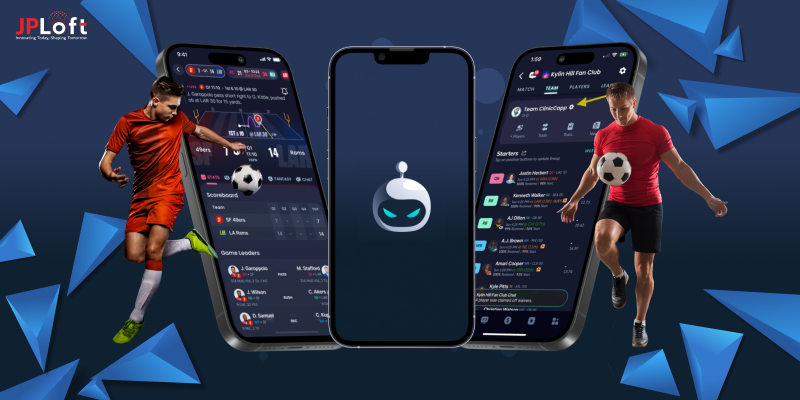Fantasy football app trends are all set to surprise us and 2025 is shaping up to be a game-changer. Did you know over 50 million users dive into fantasy football each season, with mobile apps now leading the charge?
From AI-powered team recommendations to real-time performance tracking, the latest trends in fantasy football platforms are redefining how fans engage with the game.
Whether you’re a sports tech enthusiast, a fantasy league addict, or a startup ready to enter the space, keeping up with the trends in fantasy football is no longer optional, it’s essential.
So, get ready to explore what the future holds as we are going to dive into the huddle of digital trends.
Fantasy Football and Industry-Related Statistics
Fantasy football has grown way beyond just picking players for fun. It’s now a huge industry with millions of active users and constantly evolving apps.
That’s why if you want to create a fantasy football app, you should know the latest fantasy football app trends that really matters for both fans and anyone looking to build or improve an app in this space.
Let’s take a quick look at how big fantasy football has become.
-
According to a report by Mordor Intelligence, North America has around 62.5 million fantasy sports users and nearly 79% of them are actively involved in fantasy football.
-
Over 50 million people play fantasy football each year, with most of them using mobile apps to manage their teams.
-
As per Grand View Research, the fantasy football app market was valued at $24.85 billion in 2024 and is expected to grow to $56.38 billion by 2030, with a CAGR of 15.2% between 2025 and 2030.
-
Features like AI team suggestions and live player updates are now used by over 60% of users, proving that smart tools are in demand.
-
Stats from Market Growth Reports point out that over 80% of fantasy players use the app weekly, and fantasy platforms see an 18% rise in new users during the NFL season.
With numbers like these, it’s clear that fantasy football apps are not just popular, they’re powerful tools shaping the way fans engage with the sport.
But what makes these trends truly important goes beyond just big stats and downloads. Let’s explore why keeping up with trends in fantasy football really matters.
Why is Considering Fantasy Football App Trends Important?
Keeping up with the fantasy football app trends 2026 is an essential if you want your app to stand out. Whether you're a developer, entrepreneur, or fantasy sports enthusiast, following the latest trends can give you a serious edge.
Here’s why paying attention to the fantasy football app development trends really matters:
A] Changing User Expectations
Users now expect smarter, faster, and more engaging experiences. By following the latest trends in fantasy football app development, you can design features of fantasy football apps and interfaces that users actually enjoy and stick with.
B] Staying Competitive in the Market
The fantasy app space is growing fast. Aligning with fantasy football app trends 2026 helps your app stay relevant and competitive, especially as new platforms enter the market every year.
C] Smarter Feature Development
Trends like AI-driven suggestions, live score syncing, and predictive analytics are shaping the future. These fantasy football app development trends give clear direction on what features to prioritize.
D] More Downloads & Higher Revenue
Users are more likely to download, recommend, and pay for apps that feel modern and user-friendly. Keeping up with current trends improves your app’s chances of driving both engagement and revenue.
E] Better Planning for Updates
When you're aware of ongoing fantasy football app trends, it becomes much easier to map out meaningful updates, instead of guessing what users might want next.
As the fantasy football space continues to grow, following the trends helps you stay future-ready and fan-focused. Up next, let’s explore the latest and most exciting trends shaping the future of fantasy football apps.
Latest Fantasy Football App Trends Shaping the Future
The fantasy football app trends in 2026 are all about blending innovation with fan expectations. Whether you're planning to create a fantasy sports app or want to scale an existing one, staying updated on what’s trending is the key to success.
Let’s explore the emerging trends in fantasy football apps that are shaping the future of this dynamic industry.
1. AI-Powered Team Management & Player Suggestions
AI in fantasy football is truly changing the game. Instead of users digging through endless stats or guessing lineups, artificial intelligence now does the heavy lifting. Today, AI-driven insights are helping users make smarter decisions based on real-time data, injury reports, player history, and predictive analytics.
This is one of the cutting-edge trends in fantasy football app development, using machine learning algorithms to recommend line-ups, analyze opponent teams, and even forecast player performances.
It not only enhances the user experience but also boosts engagement by making the game feel more strategic and personalized.
2. Integration of Real-Time Data & Live Score Syncing
In 2026, real-time everything is the norm. Users expect live score syncing, instant updates, and push notifications for every big move in the game. Apps that deliver this experience are thriving and those that don’t risk being left behind.
This trend is at the center of the latest trends in fantasy football app development. Data partnerships with leagues like the NFL, access to live APIs, and fast backend systems are essential to deliver a smooth, real-time experience.
If you plan to develop an app like NFL, real-time data streaming is non-negotiable.
3. Multi-Sport & Cross-Platform Compatibility
Another one of the key trends shaping the fantasy football industry is expanding beyond just football. More platforms are integrating multiple sports, cricket, basketball, baseball, and even esports to cater to a wider user base.
In addition, having your fantasy football app available across web, Android, and iOS is no longer a bonus, it’s expected.
This trend shows up often in projects where businesses want to hire mobile app developers who specialize in cross-platform technologies like Flutter or React Native.
4. Gamification & Mini Contests
To make the app more engaging, developers are adding game-like elements. Things like badges, daily spin wheels, mini challenges, and exclusive contests keep users active even on non-match days.
These fantasy football industry trends you should know aren’t just for fun, they directly impact user engagement, retention, and app monetization strategy.
Gamification adds a layer of excitement that turns casual users into loyal fans. It also opens up new revenue opportunities through reward-based features and premium access to exclusive in-app events.
5. In-App Purchases, Tokens & Reward Systems
As fantasy football apps grow in popularity, monetization methods are becoming more creative and user-focused. Many apps now offer premium leagues for high-stakes competition, token-based entry systems, and power-ups that give users advantages like extra trades or bonus points.
Some even reward users for reaching certain milestones, keeping the gameplay rewarding and dynamic. All these elements are designed to enhance the overall user experience while generating steady revenue.
However, adding such monetization features also brings certain fantasy football app development challenges, especially when it comes to analyzing user behavior and ensuring secure, seamless payment integration.
6. Focus on Data Privacy & Fair Play
With the rise of real money games and a growing global audience, the importance of user data security and fair play has never been greater. Today’s fantasy football apps are expected to include strong anti-cheating mechanisms, accurate geo-verification, age checks, and secure login and wallet systems to protect both users and the platform.
To meet these critical standards, many companies now hire dedicated developers with specialized knowledge in cybersecurity and regulatory compliance.
Whether you're launching a free-to-play app or a paid platform, data privacy and fair play aren’t just features, they’re essential pillars of trust and long-term success.
7. Voice, AR/VR & Wearable Integrations
Looking ahead, the cutting-edge trends in fantasy football app development are starting to blend with futuristic tech. Voice assistants like Alexa and Google Assistant are already helping users check scores and make trades hands-free.
Meanwhile, early experimentation with AR and VR is allowing users to experience virtual locker rooms, player stats overlays, and 3D match recaps. While still new, these innovations are exciting for users and valuable for brands.
Some app owners are now working with a mobile app development company in Denver or other tech hubs to explore how wearables and immersive experiences can make their fantasy platform stand out.
8. Personalized Dashboards & UX Customization
User interfaces are becoming smarter, too. From custom scorecards to drag-and-drop team builders, personalization is one of the top emerging trends in fantasy football apps.
Letting users choose their dashboard layout, color theme, or preferred news feeds not only makes them feel in control, it improves retention significantly.
This is especially helpful when planning the cost to create a fantasy football app, as personalization can often be done without heavy backend development, making it a smart investment for startups.
Whether you’re planning an app from scratch or improving an existing one, stay aligned with these latest trends in fantasy football app development. Just remember, while the trends offer direction, the execution is what truly matters. That’s why you can partner with the best mobile app development company to bring your ideas to life.
AI-Based Fantasy Football App Trends
AI is transforming the way users play fantasy football, and it’s one of the most impactful fantasy football app trends shaping the industry.
Here’s how AI and its core technologies like ML and NLP are making fantasy apps smarter and more user-friendly:
► AI (Artificial Intelligence)
AI powers personalized player suggestions, predictive analytics, and dynamic team management. It brings real-time intelligence into the game and improves overall decision-making for users.
Businesses looking to build intelligent platforms often invest in a reliable AI development service to bring these features to life.
► Smarter User Experience
The combination of AI, ML, and NLP creates a more intuitive, predictive, and engaging app experience.
It reduces manual effort and boosts user satisfaction by providing real-time, data-driven support.
► ML (Machine Learning)
ML helps the app learn from user behavior, match history, and player stats. It suggests better lineups and predicts outcomes more accurately over time, just like a smart coach that evolves with every match.
Partnering with an expert ML development service ensures this technology is implemented effectively and efficiently.
► Business Advantage
Whether you want to create a soccer mobile app or expand your fantasy platform, integrating these technologies gives your product a competitive edge.
With the right tech partners, you can build a smart, future-ready app that users will love.
► NLP (Natural Language Processing)
NLP allows apps to analyze sports news, interviews, and live commentary to flag injuries, lineup changes, and key updates instantly. These insights are turned into helpful alerts, keeping users informed in real-time.
A skilled NLP development service can help extract meaningful data from unstructured content like articles and social media.
In short, AI isn’t just a trend, it’s a game-changer. And with the help of expert AI, ML, and NLP development services, you can turn your fantasy football app into a winning experience.
Build Your Next Winning Fantasy Football App with JPLoft
Ready to turn your fantasy sports idea into a high-performing app? JPLoft is a leading fantasy football app development company that brings innovation, expertise, and deep industry insight to every project.
From real-time player stats and AI-based features to secure payment systems and engaging UI/UX, our team helps you build feature-rich apps that users love. Whether you're a startup or an enterprise, we tailor each solution to meet your unique goals.
Let us help you build the next big thing in fantasy sports. Get in touch today to bring your app vision to life with smart tech, scalable architecture, and ongoing support.
Final Wrap-Up
The fantasy football industry is growing rapidly and so is the competition. If you want to stand out, it’s essential to stay aligned with the latest fantasy football app trends. From AI-powered recommendations and gamification to social integration and real-time updates, the trends we’ve covered aren’t just predictions, they're the new standard.
Whether you're planning to launch a fantasy football app, upgrade an existing one, or expand into multiple sports, staying informed and future-focused is key.
Let innovation lead the way, and your app could be the next fan favorite on the leaderboard.
FAQs
Some of the top trends include AI-powered suggestions, real-time data syncing, gamification, social features, personalized dashboards, and secure monetization systems.
AI helps by analyzing player stats, predicting performances, recommending lineups, and offering real-time insights, making gameplay smarter and more strategic for users.
Trends like AI suggestions, gamification, and real-time updates make the app more interactive, keeping users engaged and encouraging regular participation. They also enhance user satisfaction, which plays a big role in boosting retention and word-of-mouth growth.
Social features like private leagues, chat, leaderboards, and shareable teams increase user engagement, retention, and help create a community-driven experience.
Yes, integrating AI, ML, and NLP is now common. It boosts personalization, performance prediction, and user satisfaction, making your app more competitive.













Share this blog